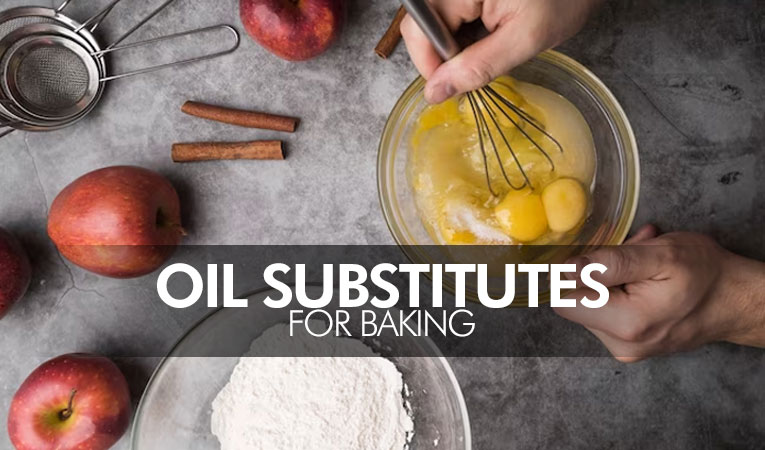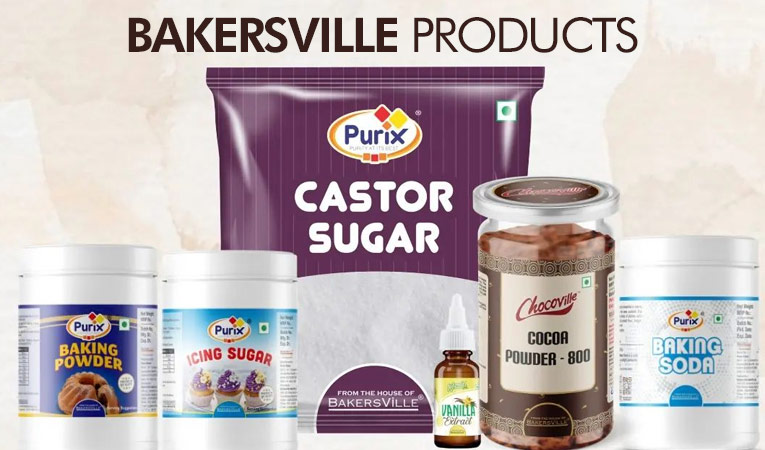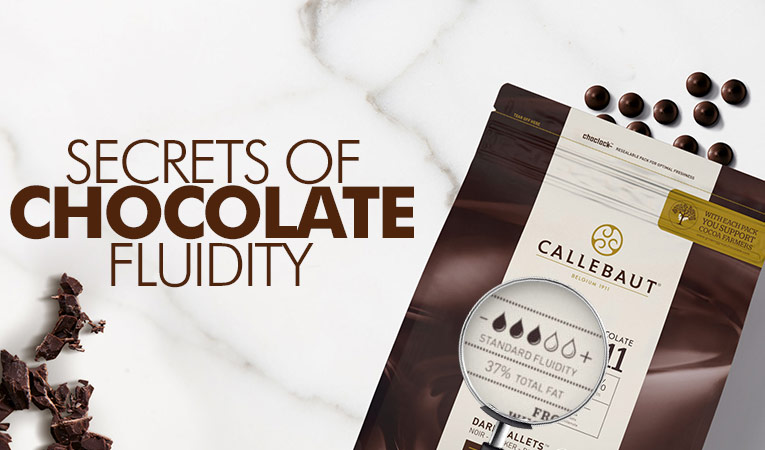Exploring Oil Substitutes for Baking
03-09-2023

Baking is a cherished pastime for many, and indulging in a homemade treat is one of life's simple pleasures. However, when it comes to healthy living, the copious amounts of oil used in traditional baking recipes can give pause. The good news is that you don't have to sacrifice taste and texture to make your baked goods healthier. In this blog, we will dive into the world of oil substitutes for baking, exploring options that will allow you to whip up guilt-free treats that are as delicious as they are nutritious. Whether you're looking to reduce calories, cut down on saturated fats, or accommodate dietary restrictions, we have got you covered. Let's embark on a journey to discover how simple tweaks in your baking routine can lead to a healthier and equally delectable outcome.
The Need for Healthy Baking
In today's culinary landscape, there's an increasing demand for healthier alternatives that allow us to indulge in our favorite baked goods guilt-free. Our journey into "The Need for Healthy Baking" begins by acknowledging this growing need. We delve into the essential aspects of guilt-free indulgence, exploring why health-conscious baking is more relevant than ever. Join us in discovering how you can create treats that not only satisfy your taste buds but also nourish your body.
- Balancing Indulgence and Wellness: In an era where wellness is paramount, striking a balance between enjoying sweet treats and maintaining a healthy lifestyle is essential. The need for healthy baking arises from the desire to enjoy the pleasures of baked goods without compromising on our well-being.
- Dietary Preferences: The diverse dietary preferences of today's consumers have fueled the need for healthier baking options. Whether it's catering to vegan, gluten-free, or other dietary choices, healthy baking allows us to accommodate a variety of eating styles.
- Healthier Living: The global shift towards healthier living has prompted individuals to seek out baked goods that not only taste delicious but also provide nutritional value. Ingredients like whole grains, natural sweeteners, and superfoods have become staples in the quest for healthier indulgence.
- Managing Allergies: Food allergies and sensitivities have become increasingly prevalent. Healthy baking allows for the creation of allergen-free recipes, ensuring that everyone can enjoy a tasty treat without worry.
- Nutrition without Compromise: Healthy baking demonstrates that we don't have to compromise on flavor or texture to prioritize nutrition. It's about reimagining recipes with nutrient-rich ingredients, resulting in guilt-free indulgence.
As we explore "The Need for Healthy Baking" and understand why it's gaining significance, it's evident that this culinary trend isn't just a passing fad. It's a commitment to savoring the pleasures of baking while caring for our health and well-being. So, let's continue this journey, uncovering delightful alternatives, and embracing the flavors of guilt-free indulgence. Whether you're looking to accommodate dietary preferences, manage allergies, or simply enjoy healthier versions of your favorite treats, the world of healthy baking offers a delicious path forward.
The Role of Oil in Baking
Oil is a fundamental ingredient in baking, serving as a versatile component that contributes to the texture, moisture, and flavor of various baked goods. Understanding the role of oil in baking is essential for creating delightful treats. In this section, we'll delve into the significance of oil, exploring its various functions and how it impacts the outcome of your baked creations.
- Texture Enhancement: Oil plays a pivotal role in tenderizing and moistening baked goods. It contributes to the ideal crumb structure, ensuring your cakes, muffins, and cookies maintain their desired softness and moisture.
- Flavor Carrier: Oil acts as a carrier for fat-soluble flavors and aromas. This means it can enhance the taste and fragrance of your baked treats, making them more flavorful and inviting.
- Moisture Retention: Oil helps retain moisture in baked goods, preventing them from drying out too quickly. This is particularly important for items like bread, which benefit from a longer shelf life with a desirable crumb texture.
- Binding Agent: In some recipes, oil functions as a binding agent, ensuring that ingredients are held together. It plays a crucial role in maintaining the structural integrity of baked goods like granola bars and certain types of cookies.
- Crust Development: Oil contributes to the development of a desirable crust in certain baked items like bread and pastries. It aids in creating a golden, crisp exterior that contrasts beautifully with the tender interior.
Understanding the multifaceted role of oil in baking equips you with the knowledge needed to make informed choices when crafting your favorite treats. From texture enhancement and flavor elevation to moisture retention and crust development, oil is a key player in the world of baking. Armed with this understanding, you can experiment, innovate, and confidently create baked goods that meet your culinary aspirations. As you embark on your baking adventures, remember that oil is more than just an ingredient; it's a partner in the art of baking, helping you achieve delightful results with every batch.
Exploring Oil Substitutes for Baking
While oil is a baking staple renowned for its contributions to texture and moistness, the culinary world is ripe with innovative alternatives. Dive into the fascinating realm of oil substitutes in baking as we explore an array of delectable choices that not only transform your recipes but also cater to your dietary preferences and flavor adventures. Whether it's for health considerations, unique tastes, or creativity in the kitchen, these substitutes are your gateway to baking brilliance.
- Applesauce: Applesauce, with its natural sweetness and moisture, effortlessly steps in as a versatile oil substitute. Whether in muffins, cakes, or brownies, it lends a pleasant fruity note while ensuring your bakes stay wonderfully moist.
- Greek Yogurt: Creamy and protein-packed Greek yogurt is an exceptional oil alternative. It elevates your baked goods' texture, leaving them soft and light. Say goodbye to guilt and hello to delightful muffins, pancakes, and more.
- Mashed Bananas: Ripe mashed bananas introduce natural sweetness and aroma while reducing the need for oil. Ideal for banana bread and muffins, they enhance both flavor and moisture in your treats.
- Avocado Puree: Avocado's healthy fats offer a creamy touch and a boost of nutrition. While it may not take center stage in your bakes, it harmonizes beautifully with other ingredients in recipes like chocolate desserts and smooth-textured cakes.
- Nut Butters: Nut butters, whether almond, peanut, or cashew, introduce rich, nutty undertones. Perfect for cookies and brownies, they bring depth of flavor and a hint of wholesomeness.
Diving into the world of oil substitutes for baking is a culinary adventure waiting to unfold. Whether you seek health-conscious choices or wish to infuse distinct flavors into your treats, these alternatives offer the perfect blend of creativity and nutrition. With these top five substitutes in your baking arsenal, every batch of muffins, cakes, and cookies becomes an opportunity to explore new horizons of taste and well-being. Let's embark on this journey where the joy of baking meets the art of mindful living.
Oil Substitutes for Baking: Measurement Chart
Baking is a delightful blend of science and art, and precision is key to creating the perfect treat. If you're looking to substitute oil in your baking adventures, ensuring you have accurate measurements is essential. This chart provides precise measurements for replacing vegetable oil in a variety of baking applications, including cakes, cupcakes, brownies, and more. Say goodbye to guesswork and hello to consistent and delicious results. Let's dive into the world of precise baking substitutions.
Measurement Chart for Vegetable Oil in Various Baking Applications
| Application | Vegetable Oil | Oil Substitute |
|---|---|---|
| Cakes | 1 cup | 1 cup (substitute) |
| Cupcakes | 1/2 cup | 1/2 cup (substitute) |
| Brownies | 1/4 cup | 1/4 cup (substitute) |
| Cookies | 1/2 cup | 1/2 cup (substitute) |
| Muffins | 1/4 cup | 1/4 cup (substitute) |
| Breads | 1/3 cup | 1/3 cup (substitute) |
In this table, the "Oil Substitute" column specifies the precise amount of the oil substitute you should use in place of 1 cup of vegetable oil for each baking application. These measurements will help you make effective substitutions in your recipes. These measurements are approximate and can vary depending on the recipe and personal preference. It's a good idea to start with these measurements and adjust as needed to achieve the desired consistency and flavor in your baked goods.
In the realm of baking, precision can make all the difference. With this measurement chart, you have a valuable tool at your disposal for healthier and more personalized baking. Whether you're reducing calories, accommodating dietary preferences, or simply experimenting with flavors, these measurements ensure your baking remains both an art and a science. Say farewell to uncertainty and hello to the joy of consistent and delicious results. It's time to bake with confidence and creativity.
Tips for Effective Substitution of Oil in Baking
The key to successful baking lies not only in mastering recipes but also in adapting them to suit your dietary preferences and health goals. When it comes to reducing or eliminating oil in your baked goods, effective substitutions are your secret weapon. In this section, we'll delve into valuable tips for making these substitutions seamlessly, ensuring that your baked treats maintain their flavor, texture, and overall appeal. With these insights, you'll confidently navigate the world of healthier baking without compromising on taste.
- Choose the Right Substitute: When selecting an oil substitute, consider the flavor and purpose. Applesauce, mashed bananas, and yogurt are excellent choices for moistness, while nut butters or avocado can lend a rich, buttery texture.
- Measure Accurately: Follow the recommended measurements for oil substitutes. Too much or too little can alter your recipe's outcome.
- Adjust Sweetness: Keep in mind that some substitutes may impact the sweetness of your baked goods. You might need to adjust the sugar content accordingly.
- Maintain Texture: To preserve the desired texture, use substitutes like Greek yogurt or silken tofu for creaminess, and aquafaba or flaxseed gel for binding.
- Experiment Gradually: If you're new to oil substitutions, start by replacing only a portion of the oil in your recipes. As you become more comfortable, you can gradually increase the amount substituted.
Mastering the art of effective oil substitution in baking opens up a world of culinary possibilities. Armed with these tips, you'll confidently embark on a journey of healthier baking while maintaining the exquisite flavors and textures you adore. Your taste buds and your health will thank you as you create guilt-free treats that bring joy to every bite. Now, let's continue our exploration into the realm of baking by understanding the role of oil in our favorite recipes.
Conclusion
In closing, let's remember that embracing healthier alternatives in our baking endeavors doesn't equate to sacrificing the delight of indulgence. By venturing into the world of oil substitutes and mastering their effective use, we can continue crafting scrumptious baked goods while upholding our commitment to health. With the valuable insights and recipes shared throughout this blog, you're now well-prepared to embark on a guilt-free baking journey. This journey will not only tantalize your taste buds but also nurture your overall well-being. So, here's to happy and healthy baking, where every bite is a celebration of flavor and vitality!





